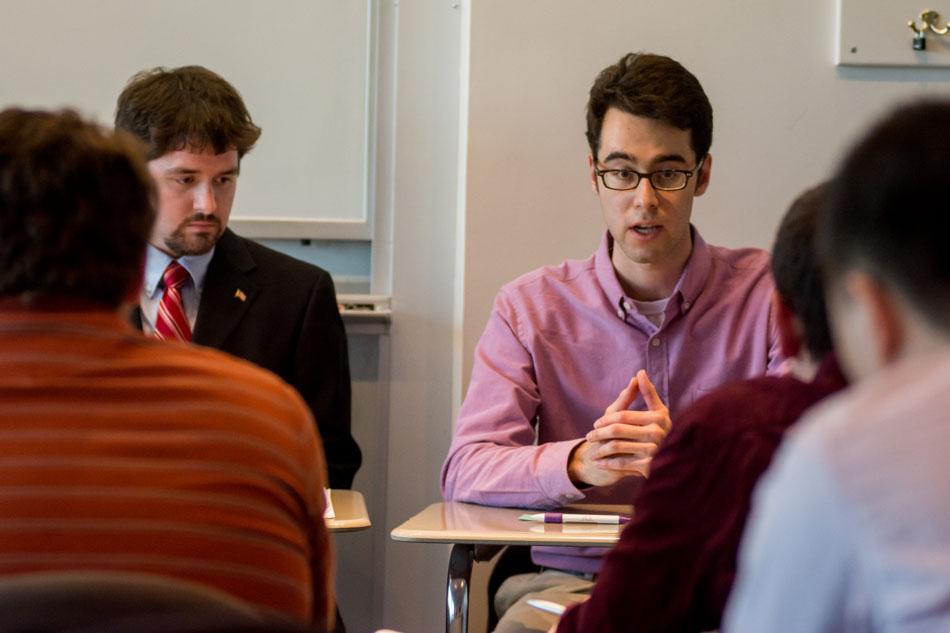College Democrats, College Republicans, Quest Scholars host discussion of income equality
Nathan Richards/Daily Senior Staffer
Dane Stier and David Friedman, members of College Republicans, discuss issues of income inequality at a student forum held Tuesday night. The event was organized as a collaboration between College Republicans, College Democrats and Quest Scholars.
April 23, 2014
Members of Northwestern’s College Democrats and College Republicans and NU’s chapter of Quest Scholars hosted a student forum Tuesday focused on different issues surrounding income inequality.
The discussion, held in McCormick Tribune Center, included a panel of three students from each political group. Weinberg junior Adam Roth, the former president of College Democrats, moderated the event. Audience input shaped the conversation, with attendees posing several questions that the panelists took turns addressing. Roth allotted both sides time to present their positions and give rebuttals.
Attendees asked questions focused on equal opportunity and its place in the nation.
The forum proceeded to address the relevance of mobility in the U.S., wrangling with comparisons to other countries and sentiments on today’s income gap. Both panelists and audience members probed further by examining statistics on income distribution nationwide.
Other topics included individual positions on minimum wage and the impact of family values on household income. Members of the audience and panel presented and contested different perspectives, revealing NU’s diversity. In response to what Roth deemed were “loaded questions” geared against a certain side, whichever side was at a disadvantage was allowed to speak first.
“It’s controversial,” said David Friedman, a College Republicans representative on the panel. “That’s why it’s important to have a discussion about it, if not to reach a disagreement.”
Weinberg freshman Lauren Thomas, an audience member, said she was glad the event addressed family values, a topic she thinks is not discussed enough but is very relevant to her background coming from rural Appalachia. She said in her community, she has witnessed a high frequency of teen pregnancies and single parenthood.
“They definitely had done their research,” Thomas said. “They really covered most of the causes of income inequality, and that is really, really important to us because most of us are going to be working. And we’re going to have children, and we want to see them go up in society and get ahead and not just by being born in the right families.”
Weinberg junior Allison Ortega serves as head of the income inequality committee, a subsection of the College Democrats responsible for organizing the event. Ortega said she was pleased with how the discussion unfolded, noting the forum was collaborative and encouraged audience members to listen to all perspectives.
“It’s easy to pick a party and only go to their events as a Republican or Democrat,” Ortega said. “When we do these collaborative things, it shows we all do care about the same issues.”
The committee was formed last spring as a place for students to address issues of financial aid, student debt and income disparity. After working with Quest Scholars last quarter on the “Class Confessions” Tumblr page that displays anonymous confessions on income concerns and opinions, the committee explored the idea of an open forum with College Republicans to begin a face-to-face dialogue.
“The assessment I got from the Tumblr was there’s a lot of pent-up frustration,” said Weinberg sophomore Quentin Heilbroner, president of College Democrats. “People were getting mad. Posters were calling out other anonymous posters.”
The confessions page, which has select posts featured on the ground floor of Norris University Center, revealed a spectrum of experiences from students struggling to pay tuition to those who are part of the 1 percent.
The panelists and audience members at the event also came from different backgrounds, with some identifying as low-income and others coming from wealthier households. Heilbroner said openness regarding student’s backgrounds is healthy, noting he had hoped the forum would begin alleviating the stigma associated with discussing such topics.
“The culture of silence has two sides,” Heilbroner said. “On one hand, people don’t talk about it, and beyond that, this is a very wealthy school … you feel like you’re the only one with these problems. This discussion is important because we are all somewhat connected, and this really is a community.”
Email: [email protected]
Twitter: @alice__yin


